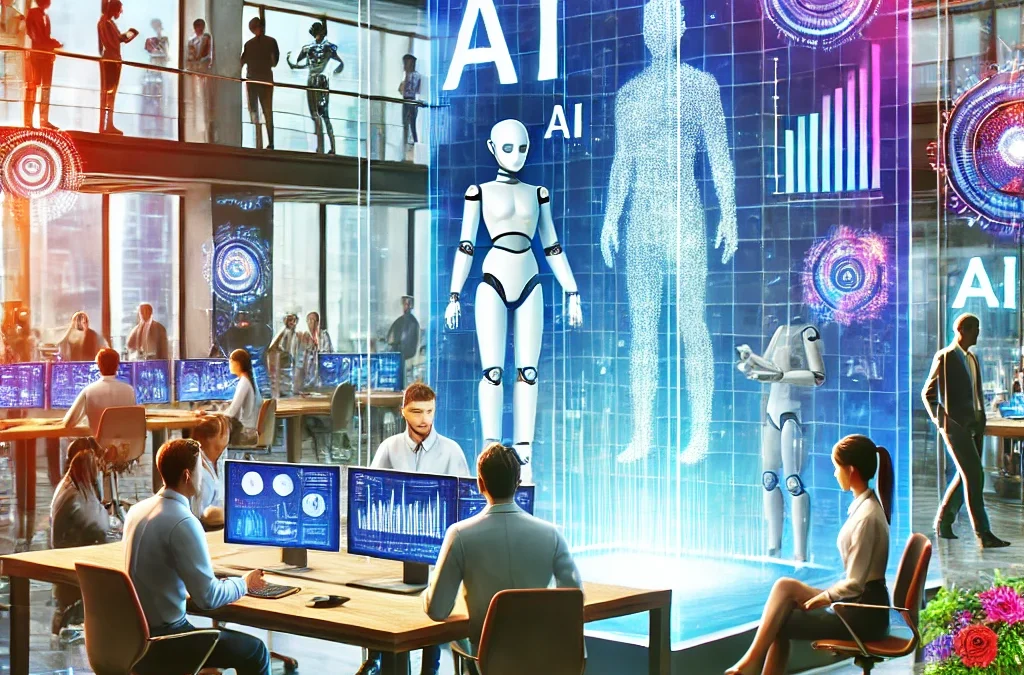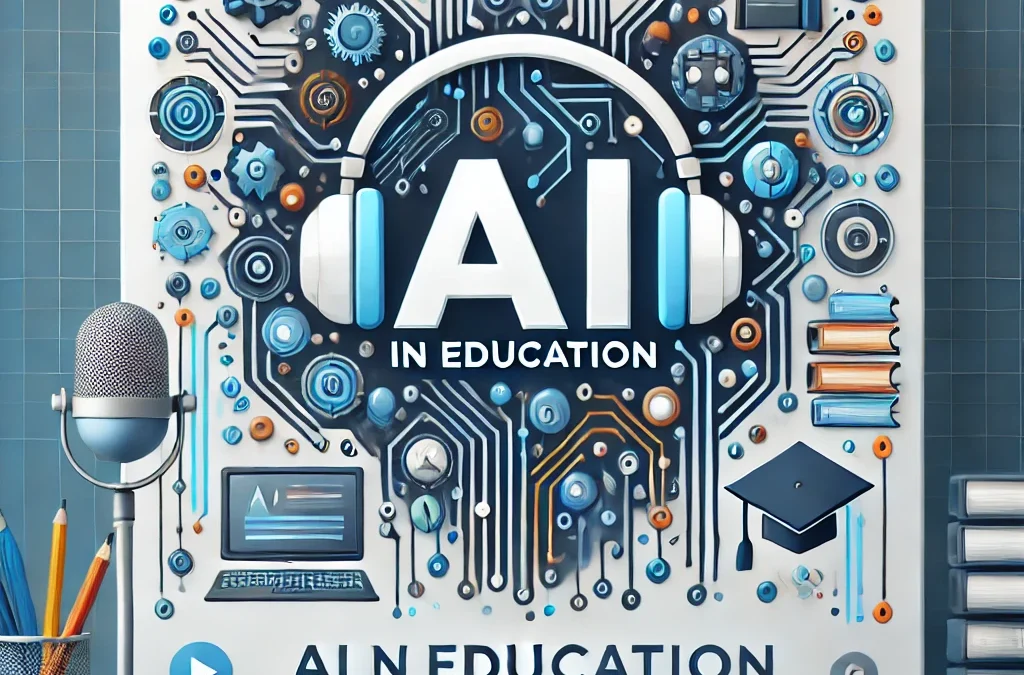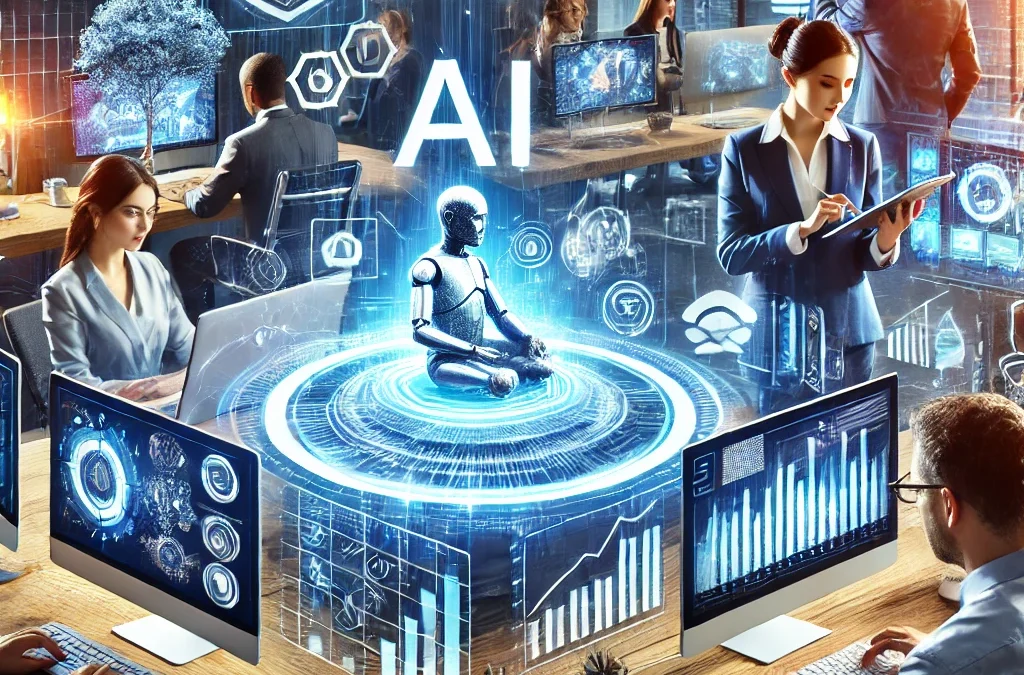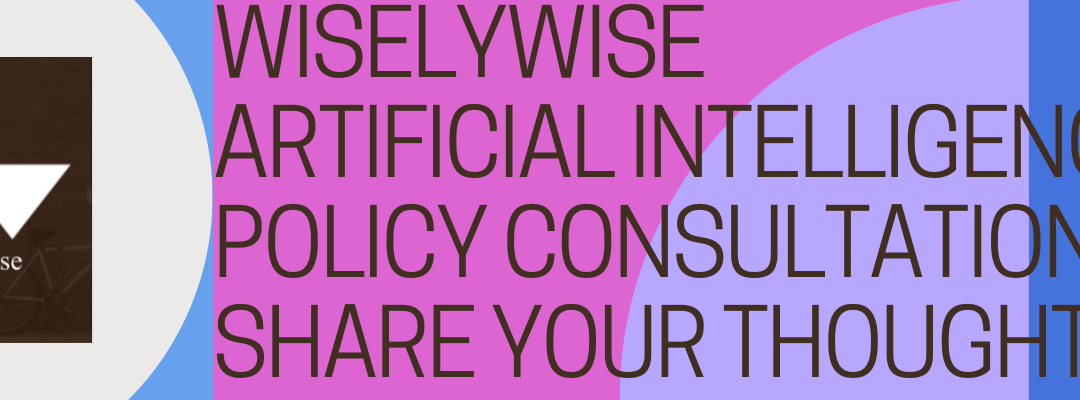
AI as a Team Member: Revolutionizing the Future of Work
Artificial Intelligence (AI) is no longer just a tool for automating repetitive tasks. It’s evolving into an integral team member that enhances collaboration, innovation, and business outcomes. As organizations adapt to the rapidly changing landscape, AI’s role is transforming from a process executor into a strategic partner. This shift in perspective is critical for businesses to stay competitive in the age of AI.
In this blog, we’ll explore how AI is moving beyond being just a tool and becoming a valuable team member in modern organizations, driving innovation, enhancing human capabilities, and creating new ways of working.
The Evolution of AI: From Process to Partnership
A Brief History of AI’s Role in Business
For years, AI was viewed primarily as a process automation tool. Businesses saw it as a means to save time, reduce costs, and eliminate the need for human labor in repetitive tasks like data entry, customer service, or transaction processing. While this automation capability has revolutionized industries, it’s only a fraction of what AI can offer.
The real revolution begins when we shift our mindset to seeing AI as a team member—a collaborator that works alongside humans, helping businesses make smarter decisions, drive innovation, and improve customer experiences.
“AI is the best teammate you’ll ever have. It doesn’t get tired, it doesn’t have ego, and it provides insights at lightning speed.” – Andrew Ng, AI pioneer
How AI is Becoming a Valuable Team Member
AI in the Sales Department: More Than Just Automation
Consider Maya Sales AI, a cutting-edge AI-led sales solution designed by WiselyWise. Initially developed to identify marketing qualified leads and automate outreach, Maya Sales AI is far more than a process tool. It has become a critical part of the sales team, analyzing prospects, personalizing engagement, and optimizing the entire sales process.
Here’s how Maya Sales AI functions as a team member rather than just a process:
- Lead Qualification: Maya AI doesn’t just gather data—it understands which leads are most likely to convert, helping sales teams focus on the right opportunities.
- Personalized Outreach: Maya crafts personalized emails and messages for each lead, ensuring engagement feels natural and relevant.
- Insight Generation: By analyzing customer interactions, Maya AI provides sales reps with actionable insights, enabling them to make smarter, data-driven decisions.
In this context, Maya Sales AI is a partner in the sales process, working alongside human sales representatives, augmenting their capabilities rather than simply replacing their efforts.
AI in Education: A Collaborative Learning Partner
AI’s role as a team member is also making waves in the education sector. Tools like Maya AI CoPilot and Maya Coach AI are designed to support educators by automating lesson planning and student assessments. However, these AI agents do much more than just handle administrative tasks. They act as collaborative partners, providing personalized feedback to students, tailoring learning experiences, and enhancing the overall learning process.
How Maya AI Enhances Educators’ Roles:
- AI-Powered Lesson Plans: Teachers can spend more time on creative teaching while AI handles the mundane task of lesson preparation.
- Personalized Student Support: Maya AI CoPilot tracks student progress and provides real-time feedback, acting as an educational assistant.
- Scalability for Coaches: Maya Coach AI enables coaches to create AI twins, offering personalized coaching sessions that scale their expertise beyond one-on-one interactions.
“AI doesn’t replace educators; it empowers them to do more by handling the repetitive tasks and providing insights that drive better outcomes for students.” – Sal Khan, Founder of Khan Academy
AI in Customer Service: The Future of 24/7 Support
Imagine a world where your customer support agent is always on, never fatigued, and capable of handling thousands of customer queries simultaneously. This is where Maya Customer Service AI comes into play. It goes beyond traditional chatbots, becoming a true member of the customer service team.
How AI Acts as a Customer Support Agent
- 24/7 Availability: Unlike human agents, AI never sleeps. It ensures round-the-clock support, answering questions and solving problems with accuracy and speed.
- Personalized Interactions: Using natural language processing, Maya Customer Service AI personalizes interactions based on past customer data, offering human-like responses.
- Escalation to Human Agents: While AI handles routine queries, it seamlessly passes complex issues to human agents, ensuring a smooth customer experience.
In this scenario, AI is working alongside human agents, ensuring they can focus on more complex and emotionally sensitive interactions. See it in action : Demo
AI in Coaching: Scaling Personalized Coaching
Maya Coach AI is more than a process tool—it’s an AI-powered team member that helps coaches scale their expertise without losing the personal touch. By creating AI Twins, Maya Coach AI replicates a coach’s style and insights, offering personalized, real-time advice to clients. This allows coaches to handle more clients at once while maintaining high-quality, individualized guidance.
How Maya Coach AI Acts as a Team Member:
- AI Twin Technology: Allows coaches to scale their one-on-one expertise into multiple, simultaneous interactions without sacrificing the quality of feedback.
- Personalized Learning: Maya Coach AI tailors advice and strategies based on client-specific needs, mirroring the approach a human coach would take.
- Round-the-Clock Coaching: With AI available 24/7, clients can receive guidance at any time, ensuring continuous support and development.
By becoming an integral part of the coaching process, Maya Coach AI empowers human coaches to extend their capabilities and improve client outcomes, all while working alongside them as a reliable partner.
See a Demo of Maya Coach AI implemented on our CEO’s AI Coaching site : Demo
AI in Marketing: Simplifying GTM and Content Automation
Maya Marketing AI offers a streamlined approach to digital marketing by automating essential tasks like Go-To-Market (GTM) strategy and content creation. Designed to support marketing teams with a simple yet effective toolset, Maya Marketing AI allows businesses to launch campaigns faster and with greater precision, without the need for extensive manual effort.
Key Features of Maya Marketing AI:
- GTM Automation: Maya Marketing AI simplifies the Go-To-Market process by automating critical steps such as audience targeting, messaging, and campaign scheduling, allowing businesses to roll out their strategies more efficiently.
- Content Creation Support: With Maya AI’s ability to generate content for blogs, social media, and email campaigns, marketing teams can focus on strategy while the AI handles the repetitive task of content creation.
- Personalized Outreach: Maya AI can personalize communication for leads and prospects, ensuring that the right message reaches the right audience at the right time, improving engagement and conversion rates.
While Maya Marketing AI is already enhancing marketing efforts with these key features, more advanced capabilities—such as full campaign optimization and predictive analytics—are part of its upcoming roadmap.
With Maya Marketing AI, businesses can automate the core aspects of their marketing operations, freeing up time for teams to focus on more creative and strategic activities. This tool is not just a marketing assistant but an integral team member helping to drive campaigns faster and more efficiently.
The Benefits of AI as a Team Member
When AI is seen as a team member, businesses unlock a range of benefits that go beyond simple process automation. Here are a few key advantages:
1. Increased Efficiency and Productivity
By automating repetitive and time-consuming tasks, AI frees up human employees to focus on creative, high-impact activities. For example, sales teams can concentrate on closing deals while AI handles lead generation and qualification.
2. Enhanced Decision-Making
AI provides data-driven insights in real-time, helping businesses make more informed decisions. In marketing, AI can analyze customer behavior patterns to predict future trends, giving companies a competitive edge.
3. Scalability Without Additional Headcount
With AI, businesses can scale operations without the need to hire additional staff. In education, for example, an AI-driven platform can manage hundreds of students simultaneously, providing personalized learning experiences that a single educator could not.
Challenges and Considerations
While AI as a team member offers transformative benefits, it’s important to address the challenges that come with it.
Trust and Transparency
One of the main challenges of integrating AI as a team member is building trust. Employees need to understand how AI makes decisions and be confident that it’s working in their best interest.
Ethical AI Use
As AI becomes more embedded in teams, organizations must ensure ethical use. This includes preventing bias in AI algorithms and ensuring that AI respects privacy and data protection regulations. Tools like Maya AI CoPilot and Maya Sales AI have built-in frameworks to ensure ethical AI use.
For more insights on ethical AI, check out this article from the World Economic Forum.
The Future of AI as a Collaborative Partner
As AI continues to evolve, its role within teams will only become more significant. In the future, we can expect AI to:
- Take on more decision-making responsibilities alongside human colleagues.
- Further integrate with existing collaboration tools like Slack and Microsoft Teams, ensuring seamless communication between AI and human employees.
- Enable real-time feedback loops, where AI learns from human actions and vice versa, creating an ongoing cycle of improvement.
“In the next 10 years, the companies that integrate AI into their teams will lead the way, while those that treat AI as just another tool will be left behind.” – Satya Nadella, CEO of Microsoft
Conclusion: Embrace AI as a Team Member, Not Just a Tool
The days of AI being relegated to back-office tasks are over. Today’s AI solutions, like Maya AI CoPilot, Maya Sales AI, and Maya Customer Service AI, are ready to work alongside your team, enhancing productivity, decision-making, and innovation.
To unlock AI’s full potential, businesses must begin to see AI as a strategic partner—a valuable team member that augments human strengths and brings new capabilities to the table. The future of work lies in collaboration between humans and AI, and the organizations that recognize this shift will thrive in the AI-powered economy.
Ready to embrace AI as a team member? Learn more about how Maya AI can transform your business by chatting with our own WiseAI Customer Service Agent here.
Contact Us: If you’re interested in collaborating with us or want to learn more about our AI initiatives, visit WiselyWise or connect with us on LinkedIn.
#AI #ArtificialIntelligence #AIPolicy #Innovation #FutureOfWork #EthicalAI #GovernmentPolicy #PublicConsultation #WiselyWise #aiinsales #sales #aiasteammember














Recent Comments